
Understanding Keto Diets for dogs
Before introducing your dog to a ketogenic diet, it is important to understand the basics of the lifestyle.
Keto emphasizes a high-fat, low-carbohydrate, and moderate protein diet that put your dog’s body into a metabolic state known as ketosis, where fat is burned for fuel instead of carbohydrates.
There are several variations of the diet and benefits to this lifestyle can include improved mental and physical performance, reduced inflammation, and improved energy levels in dogs.
What is a ketogenic diet for dogs?
Keto diets have three main components: it is high in fat, low in carbohydrates, and adequate in protein. The diet was named ketogenic because fat is converted to ketones that are utilized as energy in place of carbs which pushes the body into a metabolic state known as ketosis.
The diet aims to force your body into using a different type of fuel, fats instead of carbohydrates which are usually the main fuel burned for energy in your body.
Dietary fat provides the most concentrated source of energy in the diet. When feeding your dog a diet high in total fat you must take care to ensure an adequate intake of protein, minerals, and vitamins.
The ketogenic diet is basically mimicking a constant state of starvation by forcing the body to burn fats rather than carbs/sugars. When the body doesn’t have access to carbs it begins to break down stored fat and creates ketones to use as energy instead of sugars that come from eating carbohydrates.
Carbohydrates are found in a wide array of foods—beans, milk, popcorn, potatoes, cookies, spaghetti, soft drinks, corn, and white bread, vegetables, fruits, and beans.
Are ketogenic diets safe for dogs?

The majority of the research states that keto diets are fairly safe for dogs. One of the main reasons is that in the wild, canines will in the majority of cases naturally consume a very low amount of carbohydrates, usually between 3%-5%. If your dog were in the wild and had to hunt for their food the typical ratios of carbs, proteins, and fats would be fairly close to a ketogenic diet.
However, there can be some side effects to feeding your dog a ketogenic diet:
- Gastrointestinal upset: Diarrhea or constipation usually
- Keto flu: lethargy, gi upset as stated above (this is the same in humans)
- Renal Calculi: This is rare in dogs
- Stunted Growth: Especially if meals are not formulated properly
- Pancreatitis: Due to the high fat content of the diet, (this is under much debate as some companies, like KetoPet, attribute pancreatitis to the increased carbohydrates in the common canine kibble diet as opposed to fat
The health benefits of a ketogenic diet for dogs
There are many pet owners that have placed their dogs on a ketogenic diet and their pets have shown tremendous improvements in their diseases. While more studies are needed, some common diseases that ketogenic diets are said to help with are listed below.
Weight loss
The keto diet has become popular in humans mainly because of the weight loss benefits associated with it. The same is true in dogs fed a ketogenic diet. Since it is a calorie-restricted diet, some pet parents love the resulting weight loss they have seen in their dogs on the diet.
Neuroprotection
In humans, the keto diet is often combined with antiseizure medication in children with epilepsy and has been shown to have some protective effects for those developing Alzheimers.
There is some evidence that ketone bodies have anticonvulsant activity. While one of the earlier studies showed no change there have been case studies and retrospective studies that have shown a significant decrease or elimination of seizures in dogs fed a keto diet.
There have not been any studies specifically on cognitive dysfunction syndrome in senior dogs and a keto diet, but hopefully, those studies are underway!
Cancer
It is well known that many cancer cells rely on sugar for energy and since the ketogenic diet is decreased in carbs and subsequently sugars the cancer cells are basically starved. This is the main hypothesis that many scientists give as a reason for including a ketogenic diet in canine cancer patients. (Source). The addition of a keto diet seems to be most beneficial for dogs that are early in the disease.
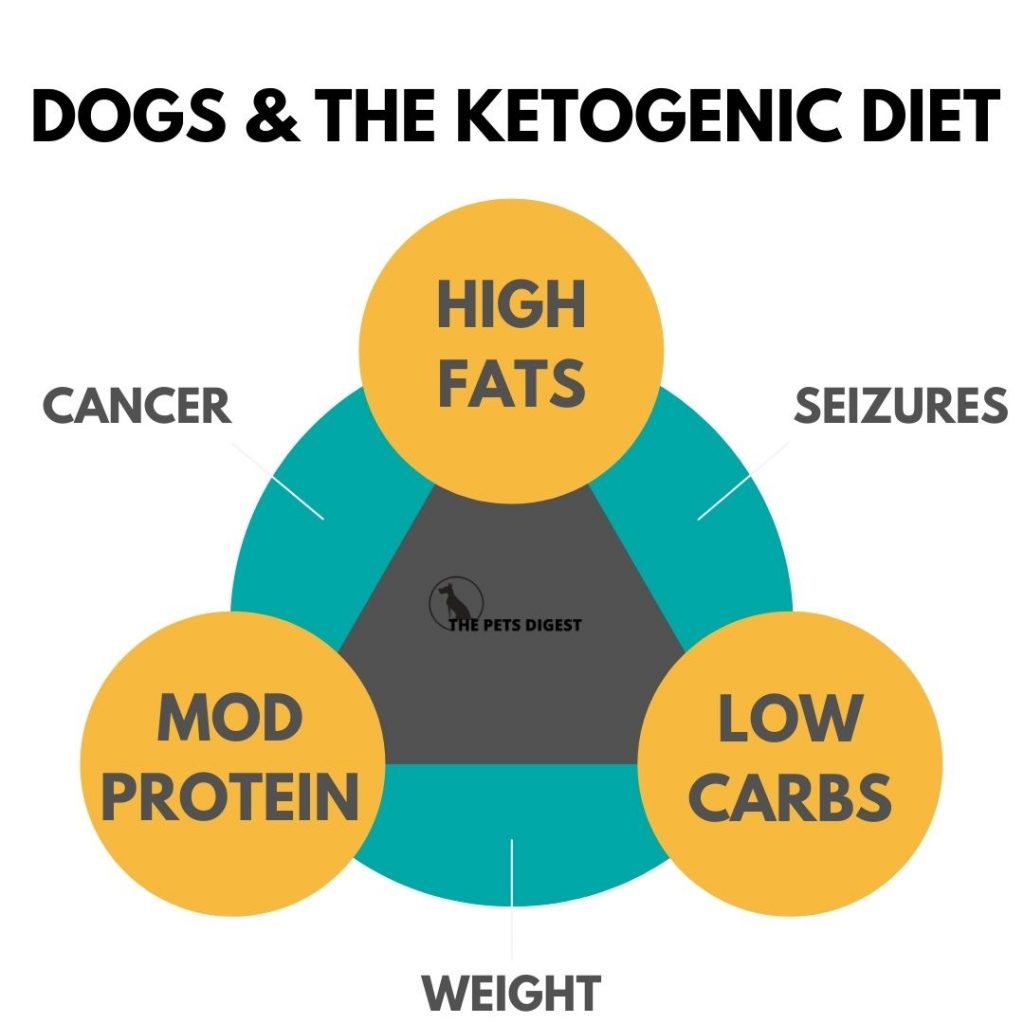
What are the potential risks of feeding my dog a ketogenic diet?
With everything in life, there are some risks associated with feeding your dog a keto diet
1. Nutritional deficiencies are the largest risk owners make when feeding their dog a ketogenic diet, especially if it is homemade
2. High fat: many dogs don’t tolerate the high-fat content of the diet well and can experience digestive upset or worse pancreatitis
3. Health contraindications: Dogs with certain health conditions, metabolic diseases, or that are on specific medications should not be fed a ketogenic diet, it is important to consult with your vet, for this reason, to determine if the diet is appropriate for your dog’s individual needs.
What dogs should not eat a ketogenic diet?
While you should always do what you feel is best for your fur baby, it is highly advised that you speak with your veterinary nutritionist before starting your dog on a ketogenic diet if they suffer from one of the illnesses below
Dogs with Pancreatitis
According to the Harvard School of Public Health, many popular ketogenic resources suggest an average of 70-80% fat which for dogs with pancreatitis or others that should eat a diet low in fat could cause a setback in any progress made on previous treatments. Dogs with pancreatitis do not do well with a high-fat diet.
Dogs with Diabetes
You would think that a ketogenic diet would be perfectly safe for a dog with diabetes, but there is one issue. You will have to carefully monitor the insulin dose you inject your pup with to ensure they don’t become hypoglycemic. This usually just entails lowering their morning insulin dose.
Dogs with IBD & Colitis
Much like pancreatitis, you want to be wary of feeding dogs with gi issues like IBD and Colitis foods with high-fat content.
Dogs with Kidney Issues
Since, although rare, keto diets have been known to cause kidney stones this should always be something that is regularly checked if you decide to put your dog on a ketogenic diet
Growing pups
This is especially true if you are going to feed your pup a homemade diet as they need an increase in protein since they are growing
A Review of the Research
While many more studies are still underway, let’s look at some of the research done on dogs that are eating ketogenic diets. Many of the studies use the MCT diet which is a form of ketogenic diet therapy. The MCT diet includes a supplement called MCT oil, which contains medium-chain triglycerides and produces ketones in the body. Click the links to visit the websites where these papers are published.





Should I start my dog on a ketogenic diet?
This is definitely an individual decision as every dog is different. Speak with a veterinary nutritionist if you are having doubts about starting your dog on a ketogenic diet or have further questions.
Since dogs are carnivores and can naturally tolerate longer periods of not eating and do not respond the same way to ketogenic diets as humans, meaning it takes them longer to go into ketosis, and when they do their bodies often produce fewer ketones. Another hypothesis is that dogs use ketones more efficiently than humans, therefore there will be less circulating.
Keep in mind that while there are some studies, there really isn’t enough clinical research and data to show if ketogenic diets could truly benefit your dog, other than cancers and possibly seizures in dogs.
Here are some questions to ask yourself while making the decision:
- Does my dog have any comorbidities such as pancreatitis, diabetes, IBS, or colitis?
- Is my dog a picky eater?
- Do I have time to make meals for my dog or the money to purchase pre-made meals?
How do I start my dog on a ketogenic diet?
Congratulations on deciding to take the plunge on feeding your dog a keto diet!
It is quite a big diet change for most dogs so before actually taking the leap and starting your dog on a ketogenic diet it is crucial that you consult your vet as they can guide you and assess your dog’s individual needs and health conditions to determine if the diet is appropriate. They can also address any concerns or potential risks and provide guidance on how to properly implement a balanced diet.
Remember that every dog is a unique individual and what works for one may not work for another so be patient with yourself, your pup, and your vet.
Now, let’s go over some of the things you will have to keep in mind when doing so.
Transitioning your dog to a nutritional ketogenic diet
Transitioning your dog to a ketogenic diet should be done very slowly and gradually to avoid any stomach upset. Start by reducing the amount of carbs in the current diet and replacing them with healthy fats.
This can be done by adding small amounts of coconut oil or whatever healthy fat you choose to include in your dog’s diet.
Over the course of two weeks gradually increase the number of healthy fats and decrease the number of carbohydrates until your dog is on a fully ketogenic diet.
It is important to monitor your dog’s weight and overall health during this transition period and make any necessary adjustments.
Items to purchase
- Glucose meter: to check your dog’s glucose levels (especially if your pup has diabetes). Blood glucose measures may be lower than average since it is no longer the primary energy source.
- Ketone meter: Check your dog’s ketones at least twice a week. It’s important to note that urine ketone strips are not a reliable indicator for dogs, since small amounts of ketones can be found in normal dog urine, and once your dog’s body has adapted there will most likely be no ketones in the urine as the body will use them instead of excreting them.
- Enzyme supplement: With older patients that may have cancer or diabetes, it is often advised to add a pancreatic enzyme supplement. This will help assist in the transition process for all pets. (Source)
If your dog’s blood glucose levels are at or below 75 mg/dL and blood ketone levels at or above 0.3 mM, then he or she is in a state of ketosis. The ketone levels may be lower especially if they are active
What do I feed my dog on a ketogenic diet?
1. Commercial Diets
If you are new to the keto diets and do not want to make your dog’s meals at home, purchasing an over-the-counter diet may be the option for you.
Ensure you purchase a species appropriate diet as these are premade and often ship to your door via a monthly subscription. One popular diet is Ketonatural, pictured below.

2. Homemade Diets
If you decide to plan and make your dog’s meals on your own, you should know that feeding a dog a ketogenic diet is a lot less complicated than it is for humans since they (hopefully) don’t eat many processed foods and sugars like cereals, candy, and bread.
You can have your dogs abstain from grains and most plant-based carbohydrates like potatoes or fruit and their fat intake can be increased through meats like lamb, beef, and fish. You can also increase green vegetables like broccoli and kale, but not carb-heavy vegetables like carrots and peas. (Source)
A canine keto diet will usually consist of at least 70% fat, 25% protein, and 5 % carbs on a dry-matter basis, meaning the moisture has been removed.
It appears that dogs adapt to a fairly wide range of fat types and amounts, but dogs usually prefer animal fats most likely due to taste (Rainvird, 1988)
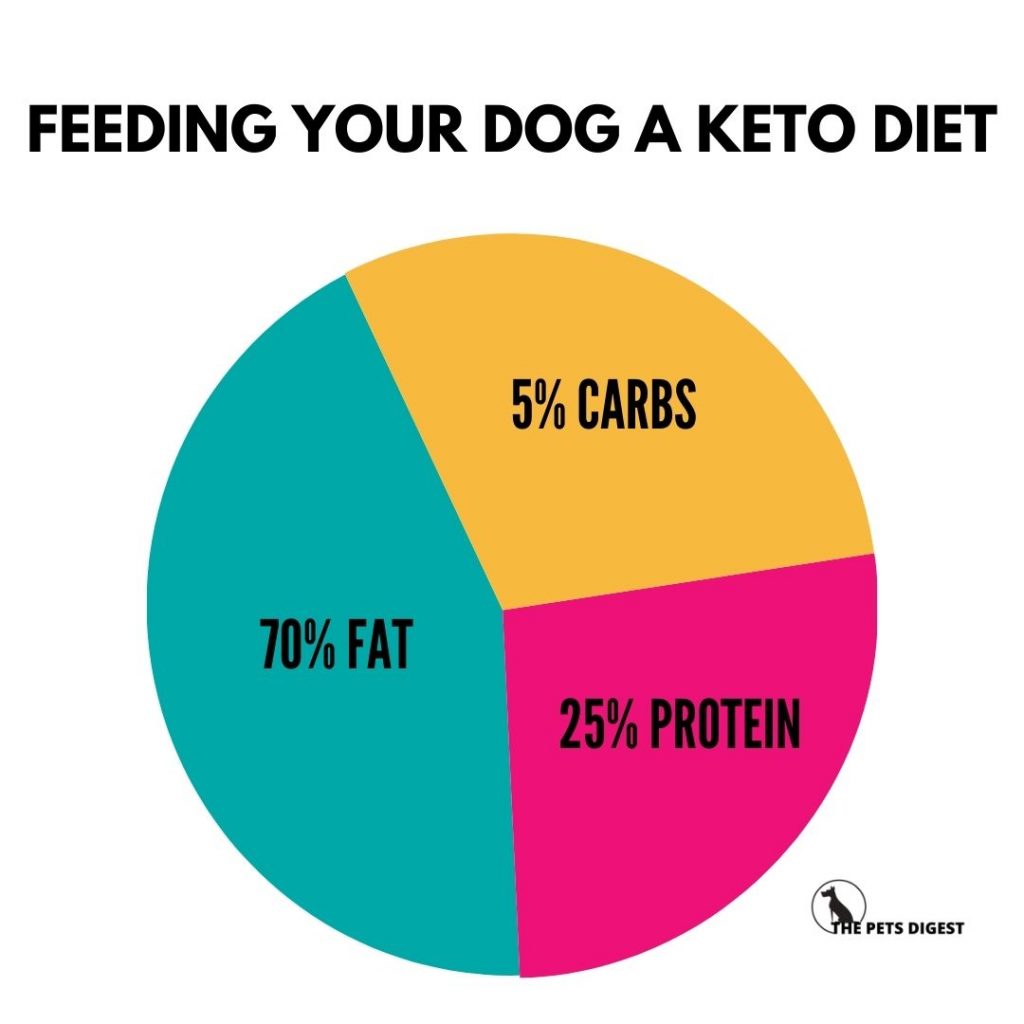
The chart below details the diet plan was given by KetoPet, which starts dogs with cancer off on option 2 of 82% fat.

FATS (70%)
- Ghee
- Kefir
- Coconut oil
- MCT oil
- Avocado oil
- Olive oil
- Pasture-raised butter
- Fats from meats
PROTEINS (25%)
- Organic Meats
- Fresh Caught Fish
CARBOHYDRATES (5%)
- Green beans
- Cabbage
- Collard Greens
- Kale
- Broccoli
- Blue Berries
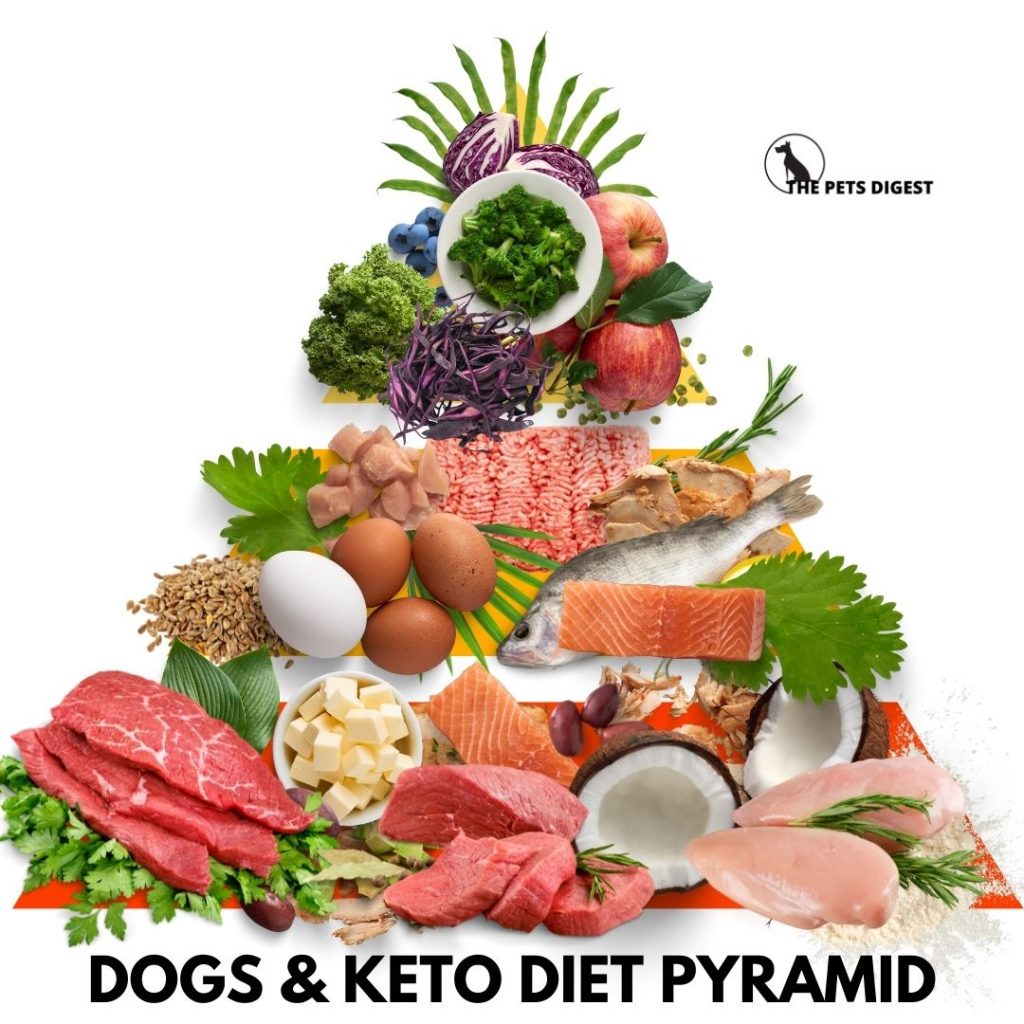
The KetoPet Sanctuary has an awesome keto diet calculator for dogs. KetoPet Sanctuary is a non-profit organization that has tested the feasibility of using a ketogenic diet as adjunctive therapy in dogs with cancer.
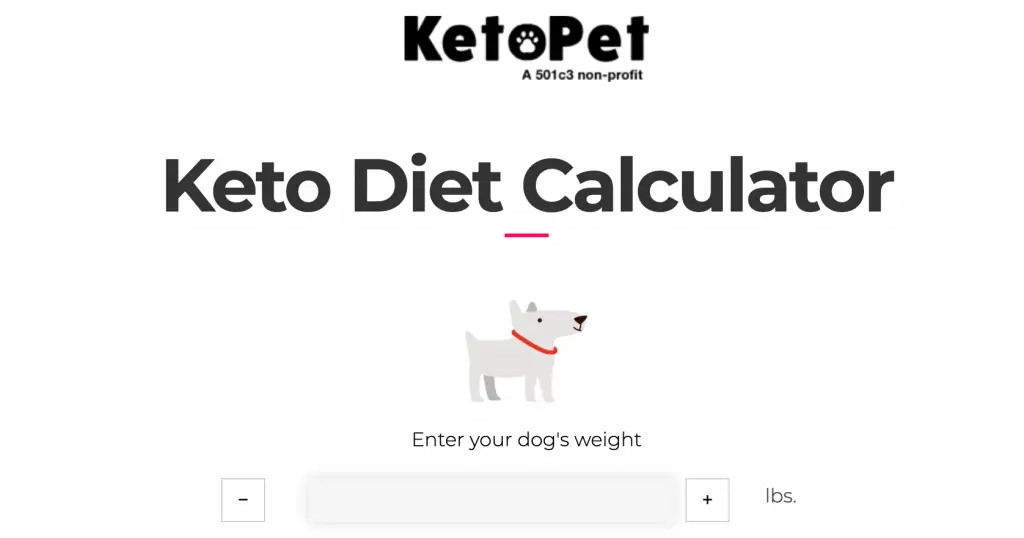
FAQs about feeding your dog a ketogenic diet
- Make the transition to a ketone diet gradually, ideally over 10-14 days
- What if my dog doesn’t like the food? Many owners find this to be true if they have very picky eaters, it is usually the fat content in the food, so try an alternative fat
- What if I want the benefits of a ketogenic diet but do not want to switch completely? You can do a modified ketogenic diet which ensures they are getting all of their necessary nutrients. You can also add MCT to your dog’s food which creates ketones.
- My dog seems sluggish after starting the diet: Your dog may feel slightly lethargic for a couple of days once starting the diet and can have some diarrhea or constipation due to the increased fat content of his or her meal
- Which Ketosticks should I use to track my dog’s ketone levels? Most keto sticks will work well, your vet may have some they prefer but these work well.
- Should I start my dog on a ketogenic diet if they have cancer? Research has shown that ketogenic diets may be helpful for dogs with cancer, specifically mast cell cancer per this journal article. To learn more about feeding a dog with cancer read our article here. Another article discusses ketogenic diets and hyperbaric oxygen treatments in mice, read it here.
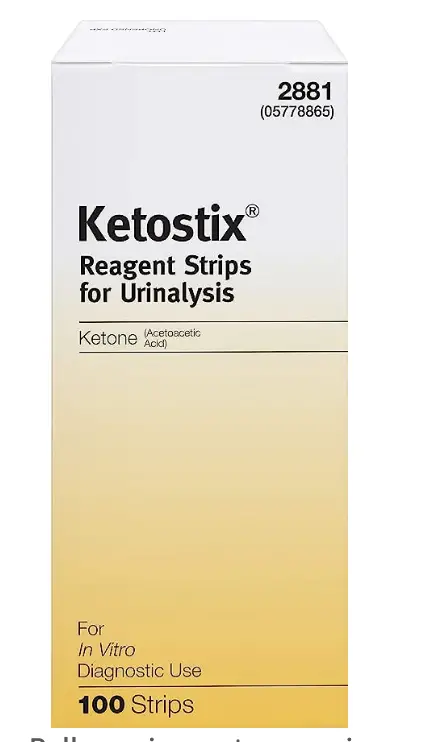
Before switching your dog to a ketogenic diet, you should always speak with your veterinarian to make sure it is the right lifestyle for your fur baby’s health and wellness needs.
A ketogenic diet requires careful planning, monitoring, and preparation of meals that include fresh, whole ingredients like nutritious proteins and healthy fats to help ensure optimal nutrient absorption.
In addition, some owners opt to add supplements like vitamins, minerals, and fiber to fill in any dietary gaps.
Have other questions about feeding your dog a ketogenic diet? Ask in our online community

























































































































